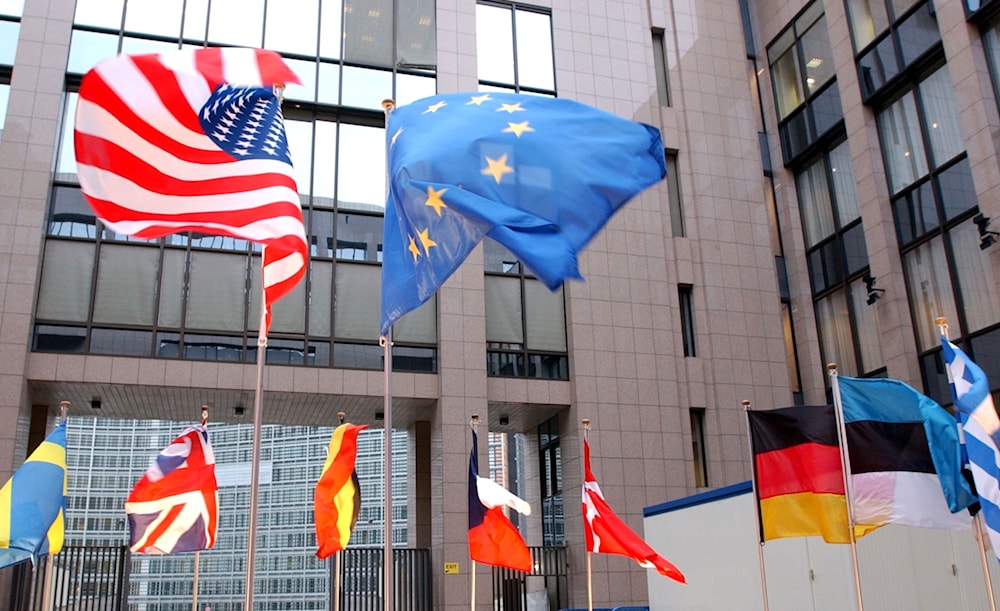The growing rift: Why US is recalibrating its ties with Europe
As the US recalibrates its relationship with Europe, a recent Izvestia analysis explores growing transatlantic tensions, NATO burden-sharing, and the strategic pivot to the Indo-Pacific.
-

In this Feb. 22, 2005, file photo, the US and EU flags, top left and right, fly in separate directions at the European Council building in Brussels. (AP)
In a striking shift that signals a recalibration of the transatlantic alliance, US Vice President J.D. Vance has delivered a blunt message to European partners: the era of unchecked American security guarantees is ending. Speaking in a recent interview for UnHerd and echoing his remarks at the Munich Security Conference, Vance called on Europe to stop acting like a “vassal” and to take greater ownership of its defense obligations. His comments reflect a deeper reorientation in US-Europe relations, one that prioritizes strategic self-interest and demands greater reciprocity.
This evolving posture, according to a recent analysis published by Izvestia, marks not a retreat, but a redefinition of Washington’s role in Europe. As the United States pivots toward the Indo-Pacific and embraces a more transactional foreign policy shaped by Trump-era thinking, the foundations of the post-WWII transatlantic alliance are under review. The piece underscores growing ideological divergence, rising trade tensions, and the potential for selective bilateralism as Washington distances itself from EU-centric frameworks.
Against this backdrop, the future of NATO, European defense strategies, and the balance of global influence are all being renegotiated. The article offers a timely lens into how this cold realignment could reshape the global order, not with dramatic rupture, but with calculated recalibration.
No exit—just a new equation in NATO
This shift has been in motion for years. What we are now witnessing is the culmination of a broader strategic realignment in US foreign policy, as per the analysis. From Washington’s perspective, the European reliance on American military power must end. The expectation is not abandonment, but reciprocity—Europe must shoulder its fair share of the collective defense burden.
This shift is especially urgent amid global instability, where resources are increasingly stretched. Vance's remarks represent not a break from NATO but a redefinition of its operational logic.
From Atlanticism to Indo-Pacific strategy
Driving this change is a deeper geopolitical pivot: a growing US focus on the Indo-Pacific, where China has emerged as the primary strategic rival. As Washington shifts its military and diplomatic attention eastward, Europe’s strategic centrality is diminishing.
Alongside geographic reorientation, there is a growing ideological divide. The United States—under the influence of nationalist, conservative thought—is increasingly misaligned with the liberal, integrationist values championed by Brussels. While many in Europe are resisting the rise of right-wing populism, such ideologies have gained traction in Washington, complicating the shared vision that once underpinned transatlantic cooperation.
Europe at risk: Misreading the signals
Europe’s postwar security and economic prosperity have long depended on two core assumptions: a reliable American defense umbrella and access to US markets. Both are now in question. If European leaders cling to outdated assumptions, they risk several consequences:
- Further economic decoupling, exacerbated by tariffs and trade tensions
- Strained energy and defense cooperation
- Rising internal divisions, which may empower nationalist movements more in line with Washington’s current ideological stance
Bilateralism over Brussels?
Europe’s fractured political landscape could serve Washington’s strategic goals. Instead of engaging with the European Union as a bloc, the US may pursue bilateral relationships with selected allies, bypassing EU institutions, as per the analysis. Vance himself hinted at this approach, noting that Washington holds “no grudge” against specific European states.
The ongoing war in Ukraine could become a test case for these shifting dynamics. While the US and EU have so far remained aligned, diverging interests in funding, arms support, and long-term strategy could reveal cracks in the alliance.
Cold realignment, not a clean break
Despite these changes, a full rupture in US-Europe relations remains unlikely, as per the analysis. What is more probable is a cold realignment—one where the United States continues to support Europe, but on revised terms. This could involve undermining EU-led initiatives, quietly backing nationalist governments within Europe, or leveraging diplomatic channels outside Brussels’ framework.
As per the analysis, Washington is not withdrawing from Europe—it is making it clear that the postwar “free ride” is over. The burden now falls on European leaders to adapt, invest, and redefine their own role in the international system.

 4 Min Read
4 Min Read










